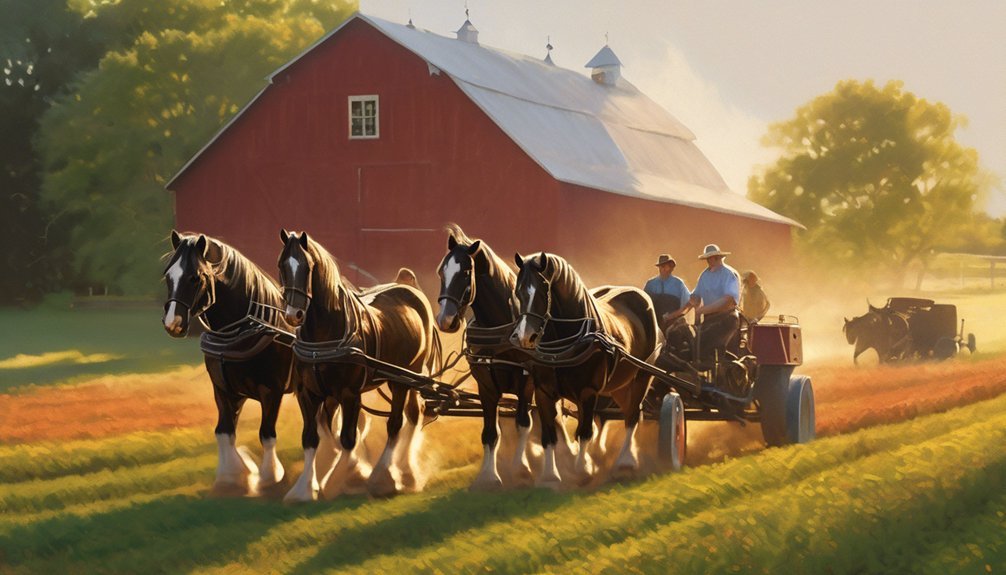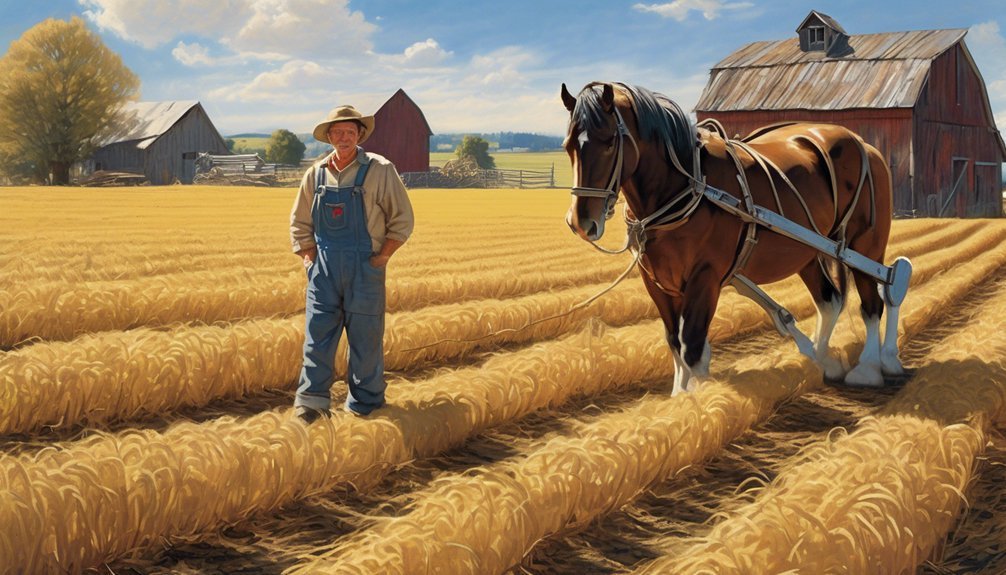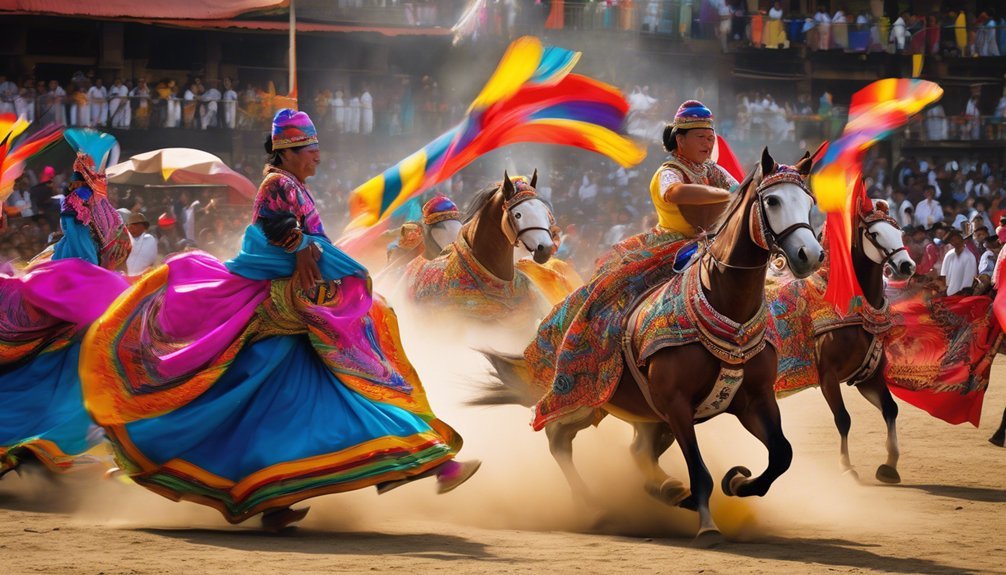
You might not realize how crucial draft horses were to the Agricultural Revolution. Their unmatched strength transformed farming, allowing you to plow deeper and cultivate larger fields. This shift not only boosted crop yields but also introduced innovative farming techniques. As you explore this topic, consider how these changes affected rural life and community dynamics. The influence of draft horses extends beyond agriculture—what does that mean for our understanding of modern farming?
Key Takeaways
- Draft horses significantly enhanced farming efficiency by providing reliable pulling power for plowing and transporting goods over larger fields.
- Improved breeding of draft horses focused on strength and stamina, leading to increased productivity in labor-intensive agricultural tasks.
- Systematic crop management practices, like crop rotation and precision sowing, were made possible through the capabilities of draft horses.
- The use of draft horses fostered community collaboration, transforming individual farming efforts into collective agricultural initiatives, strengthening social bonds.
- Modern farming continues to honor the legacy of draft horses, emphasizing sustainable practices, animal welfare, and a connection to agricultural heritage.
The Rise of Draft Horses in Agriculture

As agriculture evolved, the introduction of draft horses transformed farming practices significantly.
These powerful animals became the backbone of rural life, thanks to improved breeding practices that focused on strength and stamina. You'd notice how farmers began to select horses that could withstand long hours of labor, ultimately enhancing productivity.
Proper horse care also became essential; regular grooming, feeding, and veterinary attention ensured their health and efficiency.
By incorporating draft horses into daily operations, farmers could plow fields, transport goods, and execute tasks that were once labor-intensive for humans.
This partnership between man and horse not only boosted agricultural output but also fostered a deeper connection to the land and livestock, shaping a more sustainable future for farming communities.
Enhancing Farming Efficiency and Productivity
Harnessing the strength of draft horses revolutionized farming efficiency and productivity in ways that were previously unimaginable. By maximizing horsepower utilization, farmers could plow larger fields more quickly, significantly reducing the time and labor involved in preparing the soil.
Innovative plowing techniques, such as the use of deep-tined plows, benefited from the consistent pulling power of these horses, allowing for deeper tilling and better soil aeration. This not only enhanced crop yields but also improved the overall health of the land.
With draft horses as reliable partners, farmers gained the ability to manage larger operations, paving the way for a new era of agricultural advancement that truly transformed the landscape of farming. Your connection with these majestic creatures became vital in this journey towards greater efficiency.
The Impact on Crop Cultivation and Harvesting
The introduction of draft horses not only enhanced farming efficiency but also profoundly impacted crop cultivation and harvesting methods.
With their incredible strength and endurance, these horses transformed the way you managed your fields, allowing for more systematic practices like crop rotation, which improved soil fertility.
- Plowing deep furrows, turning rich soil for better aeration
- Sowing seeds with precision, ensuring even distribution
- Harvesting grains swiftly, reducing spoilage and loss
- Transporting heavy loads of crops to market, boosting profit
- Cultivating diverse crops, promoting biodiversity in your land
This evolution led to sustainable farming practices, helping you maintain healthy soil and bountiful harvests.
Embracing draft horses allowed you to truly connect with the land, nurturing it for future generations.
Social and Economic Changes in Rural Communities

With draft horses revolutionizing agricultural practices, rural communities experienced significant social and economic transformations.
The efficiency these animals brought to farming changed community dynamics, fostering collaboration among neighbors. As labor shifted from individual toil to communal efforts, you'd find families sharing resources and knowledge, strengthening bonds.
This collective approach not only enhanced productivity but also created new opportunities for rural labor, as more hands were needed for larger scale operations. The economic benefits rippled through the community, leading to increased trade and the emergence of local markets.
As people worked together, a sense of belonging flourished, transforming rural life into a tapestry of interdependence and shared prosperity, ultimately reshaping your community's identity and future.
Legacy of Draft Horses in Modern Farming Practices
Many modern farmers still recognize the invaluable legacy of draft horses, integrating their strength and versatility into sustainable agricultural practices. By doing so, you not only honor tradition but also promote animal welfare.
Imagine:
- The rhythmic sounds of hooves on soft earth.
- The sight of a powerful draft horse plowing fields, effortlessly turning soil.
- The bond between you and your horse, built on trust and mutual respect.
- The gentle whinny that greets you each morning, a reminder of companionship.
- The lush, thriving crops nourished by their natural, eco-friendly methods.
Incorporating draft horses into your farming routine fosters a deeper connection to the land and encourages a more humane approach to agriculture, celebrating both heritage and sustainability.
Frequently Asked Questions
What Breeds of Draft Horses Were Most Commonly Used in Agriculture?
When considering draft horse breeds in agriculture, you'll appreciate the Percheron lineage for its endurance, Clydesdale characteristics for their strength, Belgian power for heavy tasks, and Shire versatility for varied farm work. Each brings unique benefits.
How Did Draft Horses Compare to Oxen in Farming Efficiency?
When you compare draft horses to oxen, you'll notice draft horses offer significant advantages. They work faster and with greater agility, while oxen face limitations in speed and versatility, impacting overall farming efficiency.
What Were the Primary Roles of Draft Horses Beyond Farming?
Draft horses weren't just for farming; their versatility extended to transportation, logging, and even warfare. Understanding draft horse history reveals how these powerful animals adapted to various roles, enriching lives and boosting economies across many sectors.
How Were Draft Horses Cared for and Maintained on Farms?
You'll find that caring for draft horses involves consistent grooming techniques to keep their coats healthy and feeding practices tailored to their energy needs. Regular checks ensure their well-being, fostering a strong bond between you and your horses.
What Impact Did Draft Horses Have on Rural Transportation Methods?
Draft horses revolutionized rural transportation methods, enhancing logistics significantly. You'd notice how their strength enabled faster travel, improved delivery of goods, and connected communities, marking a pivotal evolution in how rural areas functioned and thrived.
Conclusion
In summary, the rise of draft horses didn't just revolutionize farming; it transformed entire communities. Imagine fields once barren, now flourishing, as farmers harness the power of these majestic animals. But what if we had never embraced this change? The agricultural landscape might look vastly different today. The legacy of draft horses lingers, reminding us of the critical link between innovation and collaboration in shaping our world. Their impact continues to echo in modern farming practices, urging us to remember their significance.





